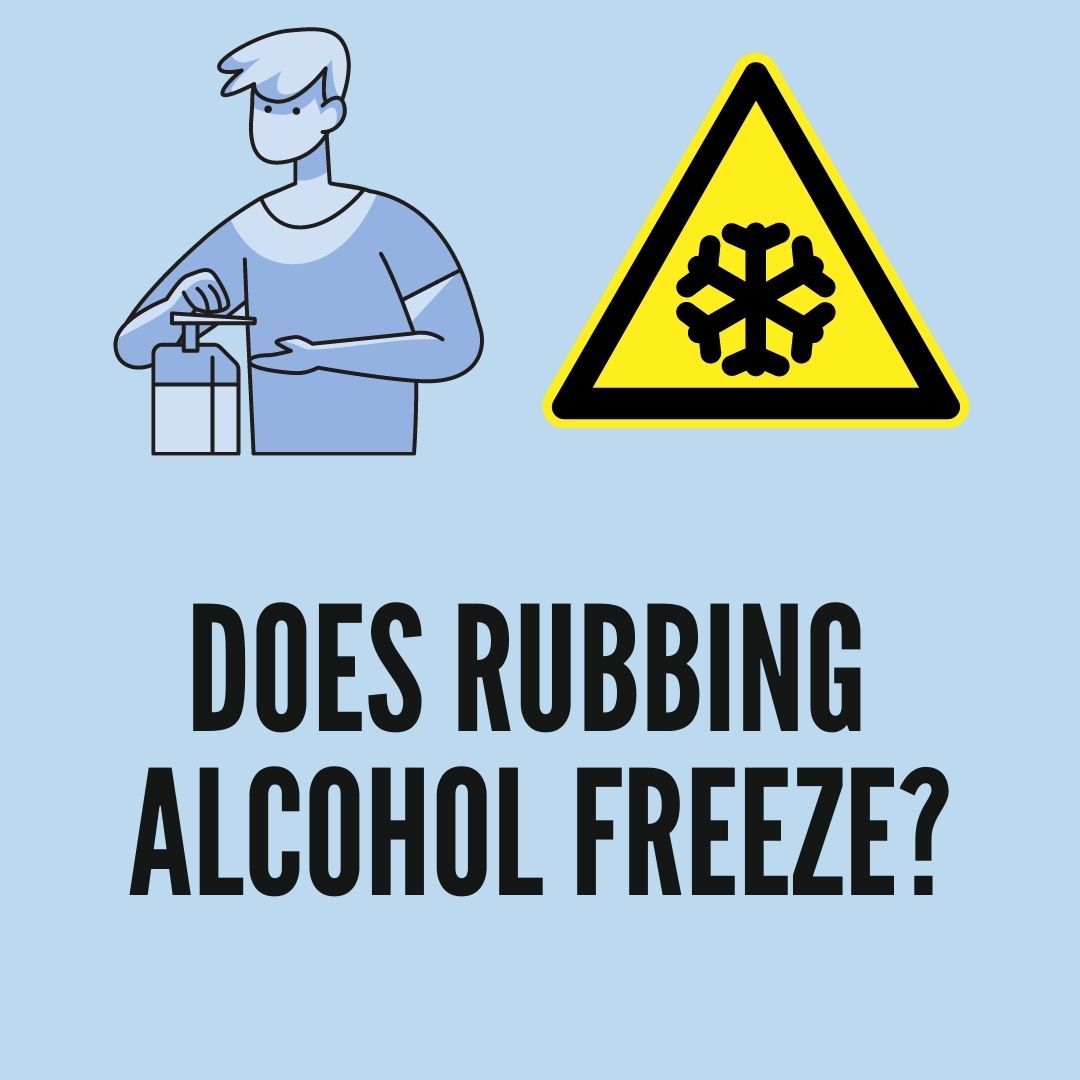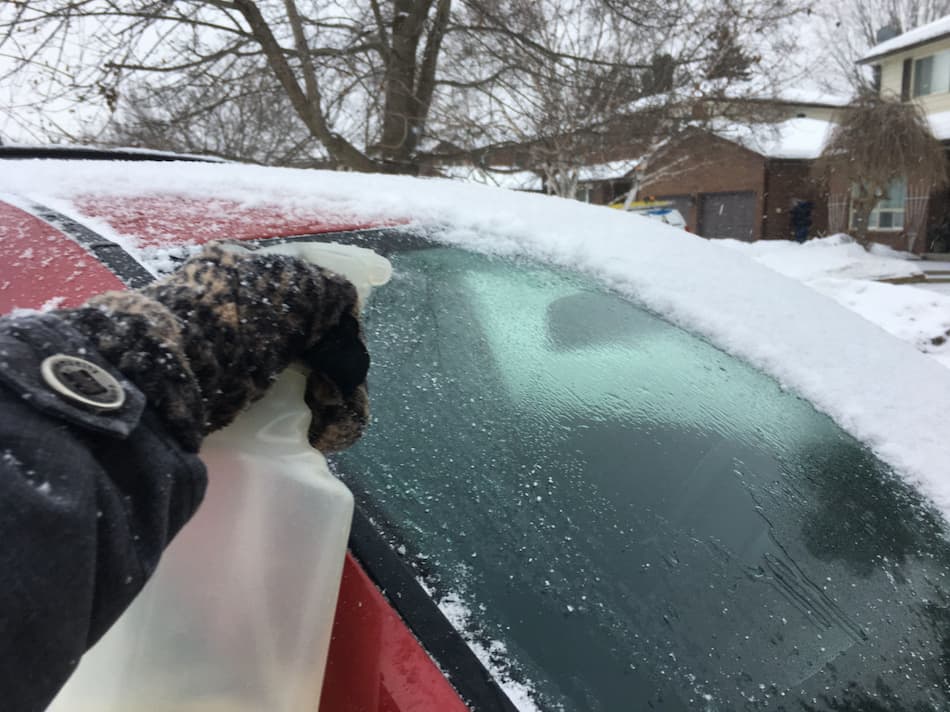
I wanted to find out if rubbing alcohol freezes, so I researched it online and found something interesting. What happens when you pour rubbing alcohol into a container and then put it in the freezer?
Wait, does rubbing alcohol freeze? Rubbing alcohol does freeze, but at a temperature of -128 °F (-89 °C). Rubbing alcohol remains in a liquid state until it reaches this temperature. Since most home freezers don’t go under -4 °F (-20 °C), Rubbing Alcohol won’t freeze in a home freezer.
Why does rubbing alcohol not freeze?
It is possible to freeze rubbing alcohol, but only if you do it right.

Does Rubbing Alcohol Freeze in The Freezer?
No, rubbing alcohol does not freeze in the freezer. Rubbing alcohol only freezes at temperatures under -128 °F (-89 °C). However, most home freezer units don’t reach temperatures under -4°F (-20 °C). Since the freezer is underpowered, rubbing alcohol won’t freeze.
Rubbing alcohol consists of one of four types of alcohol:
- Isopropyl Alcohol
- Methyl Alcohol
- Ethyl Alcohol
All three alcohol types, namely, isopropyl, methyl, and ethyl alcohol, won’t freeze in home freezers. Most rubbing alcohol brands use isopropyl alcohol blended with water in concentrations between 68% to 99%, depending on the manufacturer.
The CDC defines rubbing alcohol as a solution of 70% isopropyl alcohol with 30% water.
However, it’s important to note that dilutions of up to 25% isopropyl alcohol and 25% water won’t freeze completely in the freezer. When you start getting to concentrations under 15%, you’ll notice the rubbing alcohol blend starts to freeze.
Will rubbing alcohol keep water from freezing? Yes, rubbing alcohol can prevent water from freezing. Alcohol actually lowers the temperature at which water freezes and is often used in antifreeze for cars.
Will 70% isopropyl alcohol freeze? Yes, 70% of isopropyl alcohol freeze at around -2.5 degrees F, or -19 degrees C.
Why Does Rubbing Alcohol Contain Isopropyl Alcohol?
Rubbing alcohol formulations contain either isopropyl alcohol or ethyl alcohol blended with water.
Here’s an interesting fact; the Brits call rubbing alcohol “surgical spirits.” The liquid gained this moniker from its use in the home and hospital as a disinfecting agent for wounds and surgical tools.
While rubbing alcohol has antiseptic properties, it’s not suitable for internal consumption – drinking it could kill you.
The body metabolizes isopropyl alcohol differently, resulting in exposure to toxins that cause organ failure.
Rubbing alcohol contains isopropyl or ethyl alcohol, with the balance being water, perfume oils, and denaturants.
Users in the United States coined the moniker “rubbing alcohol” in the early 1920s. Its original use was as a salve for massage therapy.
So, what happens if you freeze isopropyl alcohol? If you freeze isopropyl alcohol, it will turn into a clear solid. This usually happens because the alcohol expands and becomes less dense when it freezes.
The change in density creates an uneven distribution of molecules which causes the liquid to become more crystalline (solid). The color of the liquid turns from a translucent white to a crystal clear colorless substance.
What are the Uses for Rubbing Alcohol Around the Home?
Today, rubbing alcohol has various uses around the home. Since it doesn’t freeze, you can use it to remove the ice from your car windshield in the morning.
It also works as a homemade ice pack when adding a 25% solution to water in a Ziploc bag.
Rubbing alcohol is also an essential ingredient in hand sanitizer and an affordable chemical for cleaning hard surfaces around the home.
Can You Use Rubbing Alcohol To Melt Ice?
Do you ever find yourself stuck in a situation where you need to get rid of ice, but don’t have any salt? Maybe for an emergency car kit. Or maybe you’re just too lazy to go outside and shovel the driveway.
The good news is that there’s something else that can melt ice just as well: rubbing alcohol.
Can you use rubbing alcohol to melt ice? Yes, you can use rubbing alcohol to melt ice. It’s cheap and efficient. However, it should only be used outside because it is highly flammable. Most ice melts available in the market contain rubbing alcohol.
Key Takeaways – Does Rubbing Alcohol Freeze?
- Most rubbing alcohol products contain a concentration of between 70% to 99%.
- Isopropyl alcohol is the most common form of alcohol used in rubbing alcohol products.
- Isopropyl alcohol freezes at -128 °F (-89 °C).
- Most home freezers don’t go under -4 °F (-20 °C).
- Diluting rubbing alcohol with water changes the freezing point.
- Solutions under 25% will start to show freezing characteristics in home freezers.
- Rubbing alcohol is also called “surgical spirits” in Europe.
- Rubbing alcohol has plenty of uses around the home.
In Summary
Do you use rubbing alcohol around the home? Isopropyl alcohol has plenty of uses, from disinfecting hard surfaces to caring for pierced ears. Some people even use it for defrosting a windshield.

My name is Logan, and I’m a 36-year-old dad who owns a small pressure-washing company in the suburbs of Atlanta, Georgia. My main goal with rubbing-alcohol.com is to show you how versatile isopropyl rubbing alcohol can be! I hope. You find it useful.
